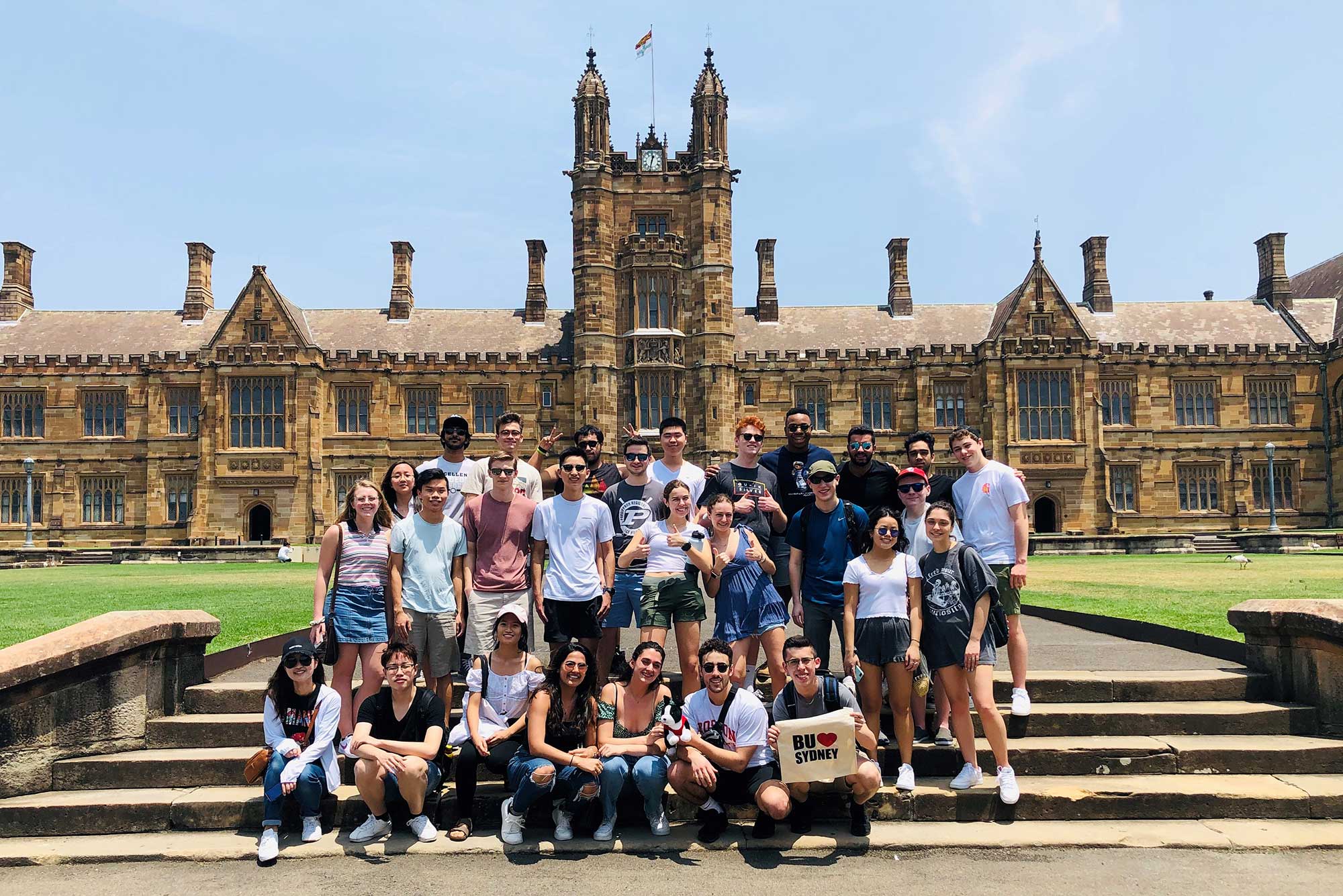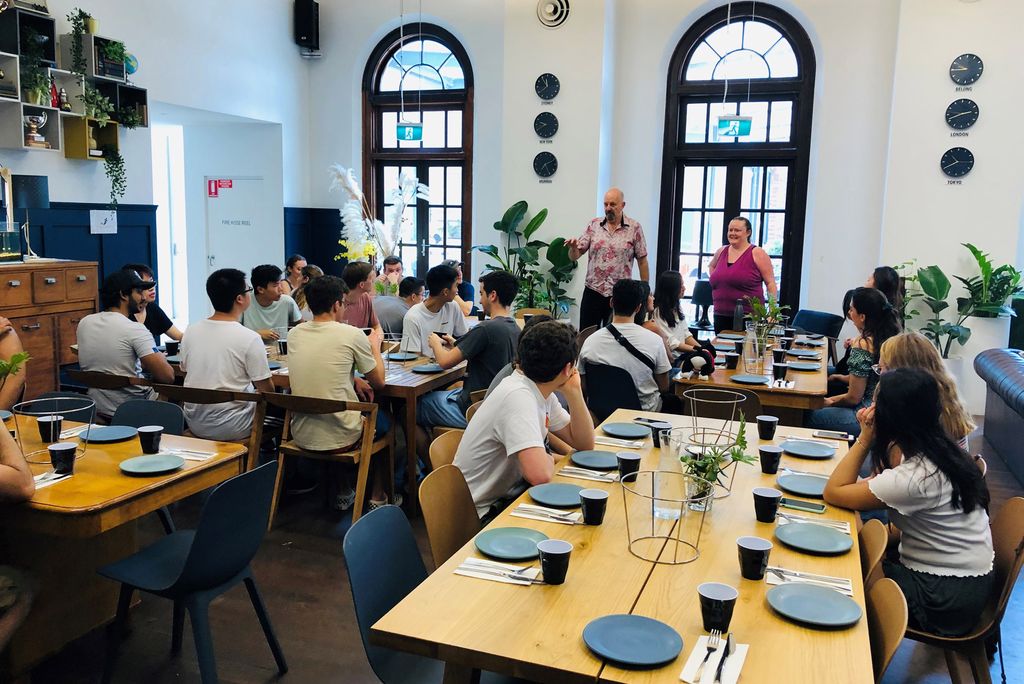Study Abroad Leaders on Coping with Coronavirus, the Return Home of heir Students, and Their Remote Links to Bosto

Study Abroad students at the University of Sydney in pre–social distancing days earlier this semester. Photos courtesy of Mark Connellan
Study Abroad Program Directors on Coping with Coronavirus, Far from Boston
Their students gone, their daily lives upended, they share their personal stories
As director of BU’s Study Abroad programs in Padua and Venice, Elisabetta Convento last month found herself near “the center of the world’s deadliest coronavirus outbreak.”
Nonstop shuttling between the two Italian cities, making sure her charges and staff in both places were all right, so exhausted her that after the University recalled all students from abroad and she knew hers were safely home, “I do not deny that I finally collapsed,” she says. Now she had to pivot to her own needs and the emotional drain of an enforced stay at home, bereft of her charges and personal contact with colleagues.
She found a moment’s relief during a video call with BU’s assistant academic director for Italy. Looking over her colleague’s shoulder, Convento says, she saw the woman’s kids had improvised a living room tennis court, their net a table cloth draped over a rope.
In such small virtual moments, and from the everyday pleasures of their lives, Study Abroad faculty and staff are finding ways to cope with a semester that has been a roller-coaster of anxiety, fatigue, and isolation, upending the dependable rhythms of the academic year.
Program directors first feared for their students’ health during a deadly pandemic, then had to bid those students farewell after BU canceled the residential portion of all Study Abroad programs.
With travel prohibitions, overseas faculty and staff can’t make accustomed trips to the United States to see colleagues, and in some cases, family. Most are living their lives under what has become a global home lockdown.
What has this ordeal been like, and how are they doing now? A few shared their stories.
Elisabetta Convento, Study Abroad, Padua and Venice
Before February was out, BU had canceled the residential portion of the Italian programs, and the almost 40 students there flew home. With the tsunami of sickness washing over the country, Convento says, “we have been locked in for longer than a month by now, and I terribly miss the students and all the activities and trips we do with them.”
She doesn’t worry about falling sick; she observes all of medicine’s suggested precautions, and Padua, she says, has an excellent clinic affiliated with one of the world’s oldest medical schools. More daunting is the isolation: the adjunct associate professor of Italian, a 20-year classroom veteran, isn’t teaching this semester, so she’s not even in remote contact with her charges.
And while Italy is her home, “I do miss my two, three trips a year to Boston, when I have a chance to connect with colleagues, faculty, and many students. I normally meet our alumni when I get to Boston. But this spring, I had to cancel my trip to the home campus twice.”
Her lifeline has been remote work, what she calls “our virtual office life…the genuine pleasure of virtually checking on each other and our families.” She and her program colleagues speak daily by phone, and “our staff Thursday meetings have become a family reunion,” remotely. “We invest quite a bit to talk about what we cooked, how the kids are doing, and how they cope with being inside, the challenge of working from home and having families there as well,” she says, before talking business.
“So far, work has kept me quite busy,” with perhaps scores of phone calls and videoconferences with BU colleagues in Italy, Europe, and Boston, sharing how she implemented online teaching and other business. “It’s a way to feel definitely less lonely,” she says. “We have now an even stronger global community of colleagues who help each other on a daily basis.”
When not working, “I cook, I clean the house, I go grocery shopping with mask and gloves once a week, I use the small terrace we have to grow plants and get some fresh air, I read. This is a good time to talk with your dear ones as well, so we have WhatsApp or Skype meetings with families scattered around Italy every week. This evening, we will have a WhatsApp aperitif!”
Mark Connellan, Study Abroad Sydney, Australia
Connellan taught the first-ever Sydney class, way back in 1992, and has been the program director since 2004. He says this semester has been a lesson in never thinking that you’ve seen it all.
“It is difficult at this stage to process all of the different thoughts and emotions that were in play over the last month or so,” he says. Before the pandemic, the global disaster news was about the lethal, unprecedented-in-scope bushfires ravaging Australia, and while Sydney wasn’t threatened, Connellan says, BU students volunteered for fundraising and land rehabilitation efforts. But when COVID-19 came, Sydney joined BU’s other Study Abroad sites whose residential programs were forced to close. The news, he says, “was received with equal amounts of sadness and reservation.” But six days later, every student who could fly home had done so.

Sydney time is 14 hours ahead of Beantown. But Connellan is an early riser. “Five am in Sydney coincides nicely with the end of the business day in Boston,” so participating in many of the business emails, texts, calls, and Zoom conferences during the pandemic—”to be honest, I have lost track of the number”—has been doable, he says.
He and his faculty and staff are enjoying their student contact from remote instruction, and Australia seems to have flattened the coronavirus curve, so he’s not too worried about his family’s or his personal safety. He’s keeping up with exercise and helping his kids with their own remote learning. But the virus has taken a toll on his routine. Only he and the program’s building manager go into the office; their colleagues work from home.
And normal travel is another casualty. “I usually visit BU at least twice a year and also visit relatives in the United States at least once a year,” he says. “Clearly this won’t be happening in the short term.”
Renée Pontbriand (CAS’91), Study Abroad Paris
From being a dual major in French language and literature and international relations to her current role directing Study Abroad in the City of Lights, Pontbriand has made her career between Massachusetts and France since graduation, with a brief detour to earn a master’s degree at Middlebury College.
She says that BU’s decision to suspend her residential program in response to the pandemic was a relief.
Pontbriand and her staff had been fretting over quarantining their students, should it come to that. Most lived in single dorm rooms with private bathrooms, a blessing in terms of avoiding congregating. “However, some students lived in homestays with older women,” she says, “and exposing our potentially asymptomatic students to them also was risky.”
“Responding to students’ questions and not being able to provide answers was very frustrating,” Pontbriand recalls. “There was a lot of pressure from students and parents to know when or if the programs would be canceled.” She understood their concern, having two daughters away at college herself and longing for them to be home and safe before the virus raged uncontrolled or travel restrictions made return all the more daunting.
“We have a very small staff who also have children to manage, so extra pastoral care for 70-plus stranded students was not something we could manage,” she says. While BU was in constant contact, the time difference “does make for 16-hour days, however, as we continued that contact with Boston until about 11 pm France time.”
Today? “I have never felt better, to be honest. Being certain that all the students are home is a huge relief. Knowing that I will not receive an emergency call in the middle of the night is also salutary. My 100-minute daily commute by train is on hold. I am sharing three meals a day with my family, exercising, and talking twice a week with family in the States. The pace of my daily life is much healthier. I live in France year-round; having my two daughters and husband safe at home with me is a blessing.” Bimonthly Zoom meetings with other directors and puttering in her yard weekends are both a joy.
But she worries about her parents and family in Rhode Island, and doesn’t know when she’ll be able to see them next. Neither her family nor their circle in Paris has the coronavirus, and they’re religiously following the same precautions many are taking, from online grocery shopping to staying home.
As for the future, Elisabetta Convento says there’s comfort in an Italian classic of the past. She quotes the closing lines of Dante’s Inferno, as the narrator departs hell:
The Guide and I into that hidden road
Now entered, to return to the bright world;
And without care of having any rest
We mounted up, he first and I the second,
Till I beheld through a round aperture
Some of the beauteous things that Heaven doth bear;
Thence we came forth to rebehold the stars.

Comments & Discussion
Boston University moderates comments to facilitate an informed, substantive, civil conversation. Abusive, profane, self-promotional, misleading, incoherent or off-topic comments will be rejected. Moderators are staffed during regular business hours (EST) and can only accept comments written in English. Statistics or facts must include a citation or a link to the citation.